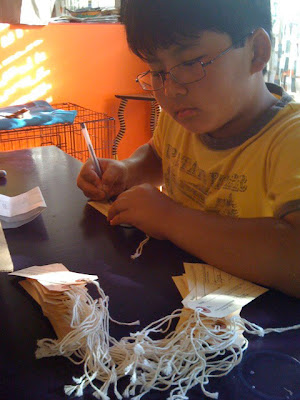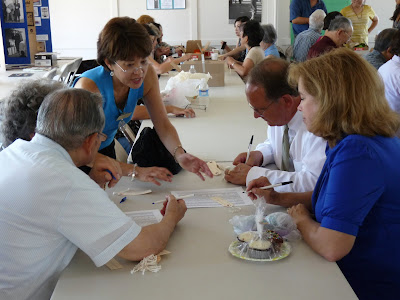



My list of volunteers is growing, its wonderful. I am going to start listing them all here! If I have missed your name, please let me know ASAP and I will add this.
Valerie Abe
Verna Abe
Jenn Anderson and Chris Flores + Joseph
Carrie Andreson - Manzanar Historical Site
Hayami Arakawa
Roy and Alice Asaki
Bryan Baldwin
Jerome Baldwin
Lill Barton
Margo Bebinger
Judith Bender
Sharon Black
Beverly Buehner
Lyle Boatman and Alberto Cortes
Jon Bonser
Kristen Bonser
Bif Brigman
Barbara Broadwell
Dale Broholm
Terri Bryson
Buddhist Temple San Diego
Olaitan Callendar-Scott
Linda Canada
Miriam Carpenter
Leslie Casey
Jorge Chang
Monica Chau
Ron Chun and Family
Tim Clark
Kathy Clenney
Joyce Corpuz
Gabby Kubo Dannemiller
Glen Date
MaryJean Date
Marc D'Estout
Jessica Dombrowski
Mary Donald
Steffanie Dotson and Alec Holcman
Henry Drewal and Sarah Kahn
Fran Ellis
Vicki Endow
Allison Endow
Al Endow
Christine Enos
Carol Estes
Jeremy Estil
Chris and Diane Feddersohn
Arline Fisch
LaBelle Fischl
Dennis FitzGerald
J. Michael Floyd
Logan Five
Terri Fong
Nancy Ford
Amy Forsythe
Franklin High School, Los Angeles
Doreen Fujii
Jasmine Kiyomura Fujii
Staci Kiyomura Fujii
Jonathan Fujimura
Coreen Fujinami
Trisha Fujinami
Bruce Fujinami
Leann Fujinami
Rachel Fuld
Dave and Kate Furukawa
David and Natchi Furukawa
Laura Furukawa
Marian Furukawa
Nicki Furukawa
Tooru and Mieko Furukawa
Duncan Gowdy and Elizabeth Siler
Jo and Juan Green
Michiko Grosvenor
Judy Gust
Larry and LaBelle Haeger
Jun Hanamoto
Bonnie Harkins
Julie Harris
Kristin Hashimoto
Susan Hasegawa
Grace Hauseur
Krystal Hauseur
Joanne Hayakawa
Lee Hayashi
Matthew Hebert and Lara Braff
Laura Henschen
Heidi Hester and Chris Ono
Jenny Higashi
Grace Honda
Wayne Hosaka and Kathleen Fabry
Erin Hutton
Chiz Imoto
Robert Ito
Miki Iwasaki
Therese James
The James Renwick Alliance, and the Renwick Gallery/Smithsonian Institute
Japanese American Historical Society San Diego
Japanese American National Museum Volunteer/Docents - Lee Hayashi
Gary Jio
Tami Joplin
Kirby Jones
Will Kaku
Trace and Mildred Kawasaki
Jerry Kamei
Sumi Kastelic
Martin Katz
Sakie Takahara Kawakawa
Mitsuko Kawamoto
Yuki Kawamoto
Umeko Kawamoto
Bree Keaveney
Mary Sue Kern
Cindy Kitade
Dot Kimura
Jim Kimura
Rebecca Kinder
Dianne Kiyomoto
Edward Kobayashi
Yuri Kobayashi
Fred Kochi
Debra Kodama
Garrett Kodama
Mari Koudi
AJ Koudi
Keiko Kubo
Doris Kuwada Kunimura
Sharon Kunugi
Kelsey Lamberto
Martha Lathrop
Annette Lau
Bob Leathers
Chris Lee
Rachelle Lim
Mary Little
Linda Muroi
Adam Manley and Amertah Perlman
Karen Maruyama
Laurie Maruyama
John and Reiko Maruyama
Heath Matysek-Snyder
Yuki Mathias (Tule Lake Pilgrimage)
Gail Schneider Matlin
Lori Matoba-Wun
Mary Matsunaga
Mary Oda Matsuoka
Heather McCalla
Ingrid Menken
Terry Mirashiro-Sonoda
Ken and Judy Miyamoto
Tosh Miyashita
Tara K. Mochizuki
Molly Momii
Gwen Momita
Alan Momohara
Emily Momohara
Kiku Mori
Susan Moribe
Beverly Morisako
Noel Myers
Chizu Nagano
Sam and Pauline Nakamura
Susan Nakamura
Patty Nakamura
Reiko Nakamura
Wendy Nakamura
Chizu Nagao
Anne Nakahiro
Terry Nakahiro
Andrea Nakano
Mira Nakashima
David Nesmith
Cheryl Nickle
Sachi Nishida
Yoshio Nishimoto
June Noda
Jill Oda
Amy Okamura
Malia Okamura
Melvin Okamura
Yas and Jim Okazaki
Karen Okuhara
Roy Okuhara
Shirly Omori
Gary Ono
Momii Palapaz
Chulyeon Park
Todd Partridge
DiAnne Patrick
William Peters and Guy Stiles
Amerta Perman and Adam Manley
Pioneer Ocean View United Church of Christ, San Diego
Poway High School - AVID Program
Jami Primmer
Dean Pulver
Richard Rachel
Lani Reifenrath
Karl Renz
David Richardson
Tedi Romero
Bird Ross
Gwynne Rukenbrod
San Diego High School
San Diego JACL
San Diego Japanese Christian Church
Ami Sanders
Lean Sanders
Jared Sanders
Shelly Sanders
Betty Santohigashi
Shun Santohigashi
Lill Sasaki
Steve Sato
Reid Schoonover
Bill Schairer
Cathy Schairer
Michelle Session
Roy and Sachi Shibata
Janice Shigehara
Jane Shigeta
Fusa Shimizu
Jamie Shimizu
Roger Shimomura (Minidoka Pilgrimage)
Jeannette Shin
Kimberly Shintaku
Amy Shinzaki
Dylan Shinzaki
Karen Shinzaki
Helen Shirk
Jane Shirk
Noah Shirk
Yone Shiwotsuka
Bob Sims
Libby Sinclair
Joshua Smith
Susan Smithey
Thomasina Stancil
Deborah and Bill Stern
Chris Steussy and Norma Pizarro
Connie (Hatsuko) Yahiro Stricklen
Roy Sumino
Masao Suzuki
Naoko Suzuki
Marie Switkes
Tom and Mitsy (Kiyomura)Takeoka
Janet Takahashi
Amy Takahashi
Steven Takahashi
Amy Takahashi
Edith Takeshita
Ruth Takeshita
Ramona Tamiyasu
Karen Tani
Joyce Teague
Tennessee Technological University, Cookeville, TN
Rachel Saelid
Cassidy Duckett
Jordan Frye
Daniel Hassler
Billy George
Jordan Kear
Ryan Pate
Ellen Kleckner
Carey Harding
Daniel Bell
Miles Koester
Mike Linsten
Mirrah Johnson
Sydney Ray
Andrew Thompson
Tyler Reagan
Katie Svendson
Chris Mayville
Christian Gibbs
Robert Bruce
Jodie Masterson
Lucas Barker
Bree Beliles
Kelsea Gilliland
Timber Powell
Michael Floyd
Rachel Clark
Judith Sullivan
Kathryn Forbes
Chris Bogle
Kimberly Winkle
Graham Campbell
Sam Terasaki
Judy Teshima
Susan Thompson
Leslie Tiano
James Tiffany
Mits Tomita
Aki Tomiyama
Ginger Tuholski
Noreen Tuholski
Andrew Tuholski
Mariah Tuttle
UCLA Nikkei Student Union (Beth Uno, Edward Kobayashi and Miki Koga)
UC Riverside Asian Pacific Student Programs
Georgiana Uda
Taeko and Tom Udo
Yas Umeda
Massie (Horiuchi) Uyeda
Xavier Vasquez
Marcela Villasenor
Ruth U. Voorhies
Carol Van Heerden
Betty Walker
Beth Wallace
Lori Walton
Hanako Wakatsuki
Alicia Watanabe
Doug Watters
Charleen Weidell
Tracy Wells
Judy Wilkinson
Kim Winkle and Graham Campbell
Shuyi Wong
D Wood
Efton Woodford
Ben Wooten
Alisa Wright
Chris Wright
Karie Wright
Nick Wu
Shigeru Yabu
Jane Yagade
Fumie Yahiro
Martin Yahiro and crew in Maryland!
Janet Yahiro
Jennifer Yahiro
Liz and Joe Yamada
Keith Yamaguchi
June Yamamoto
Peter Yamamoto
Yuki Yamashita
Stella Yee
Vernone Yoshioka
Christine Yoshioka
Judy Zinn Dedek
Ollie Zinn



